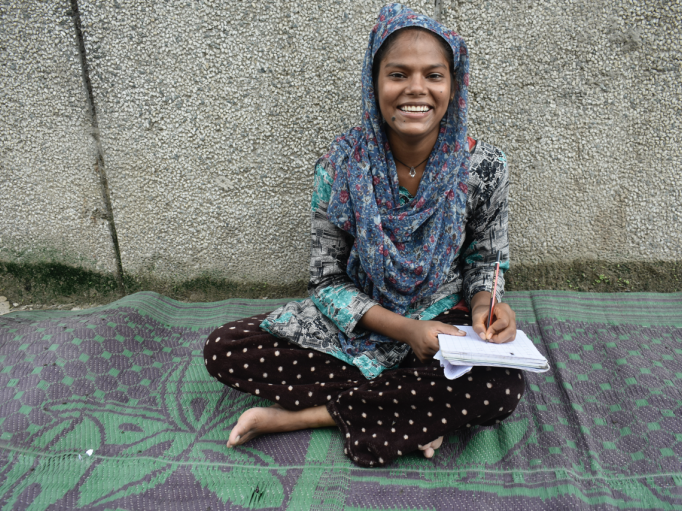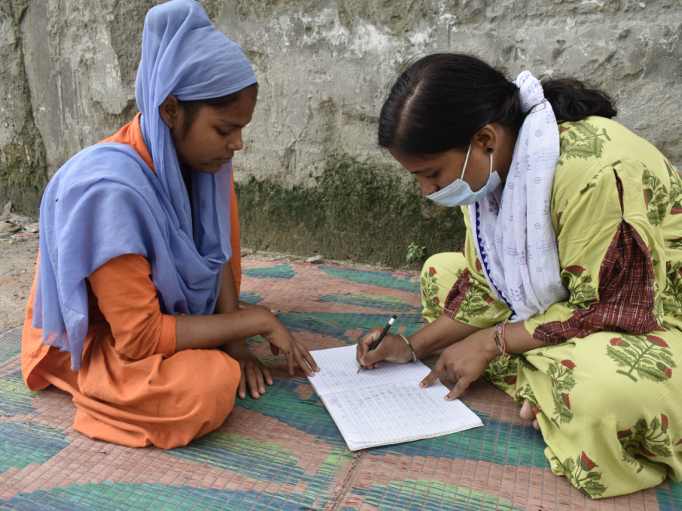“Before, I sometimes had to use wet clothes as sanitary pads because I didn’t have anything else – my thighs used to get grazed and infected.” Ritu

When family income becomes a family affair
Coming from a family of 12, life has always been hectic for 16 year old, Ritu. Just before she was born, her family moved to West Delhi from Uttar Pradesh in search of more employment opportunities. However, life was hard. Although Ritu’s father had a job selling locks and keys, he struggled with addiction and often spent his earnings on alcohol instead of his children, while Ritu’s mother suffered a long illness that made it impossible for her to work.
These challenges meant that Ritu and one of her sisters soon felt the pressure to find work to earn money for the family. Before long, Ritu found a few jobs working as a maid in several households, which she balanced with the chores at home to support her mother.
One day in 2019, Ritu saw a street educator from Toybox’s partner CHETNA, teaching some children like her life skills through sport. Her curiosity got the better of her and she went to find out more. Before long, she was enrolled in the project and her interest in studying started to be satisfied. Her confidence grew, her leadership skills flourished and she became more able to express herself in front of others.

Restrictions and lockdowns on India's streets
When the pandemic brought lockdowns in India, Ritu’s family were living hand to mouth with no sources of income. There was barely any money to buy food, so when Ritu’s period came, there was no hope of buying sanitary pads – her mother had even scolded her for trying to buy them instead of rations. So, Ritu was forced to use old clothes.
“Sometimes, we didn’t even have sufficient cotton cloths, so we had to use synthetic clothes instead which cause a lot of rashes. Even in these situations, I had to go to work.” Ritu
Thankfully, through her attendance at the project, Ritu was able to access support from CHETNA. She received sanitary pads, dry ration packs for food as well as health and hygiene kits and stationery to help her continue to learn. Through this support, she’s also been able to teach her family about menstrual health.
Smashing taboos around periods
Before, Ritu’s family followed many of the traditions surrounding menstruation in India. Until this point, each month when Ritu was on her period, she was not allowed to sleep in her bed, instead moving her bedding onto the floor to sleep. She washed 4-5 times a day to stay clean and wasn’t allowed to touch anything edible for fear of making it dirty. Many myths and taboos like these exist in Ritu’s community about menstruation and one other is that if a girl starts menstruating early or late, people assume religious misbeliefs or body disabilities on the girl. They may believe she has been cursed, which in turn it is believed, will cause problems in her future marriage. Now, thanks to the project however, Ritu is determined to challenge this idea about menstruation in her community.
Now, Ritu understands these actions are a result of myths and she has taught her mother the importance of sanitary pads, as well as encouraging her friends to start using them as well. Her independence and courage have helped to break the stereotypes and now her mother and friends are all more comfortable during their periods. In the future, she wants to build her own career and stand on her own feet by working to earn money.
“I feel extremely good about using sanitary napkins as I don’t have to worry about staining or the cloths falling out in the middle of nowhere. Before I sometimes had to use wet clothes as sanitary pads because I didn’t have any others – my thighs used to get grazed and infected. Now I can easily walk and do my chores – I want to tell all the young girls that we should use sanitary pads to stay hygienic and have a carefree period. We should never use old wet clothes to avoid irritation and problems.” Ritu